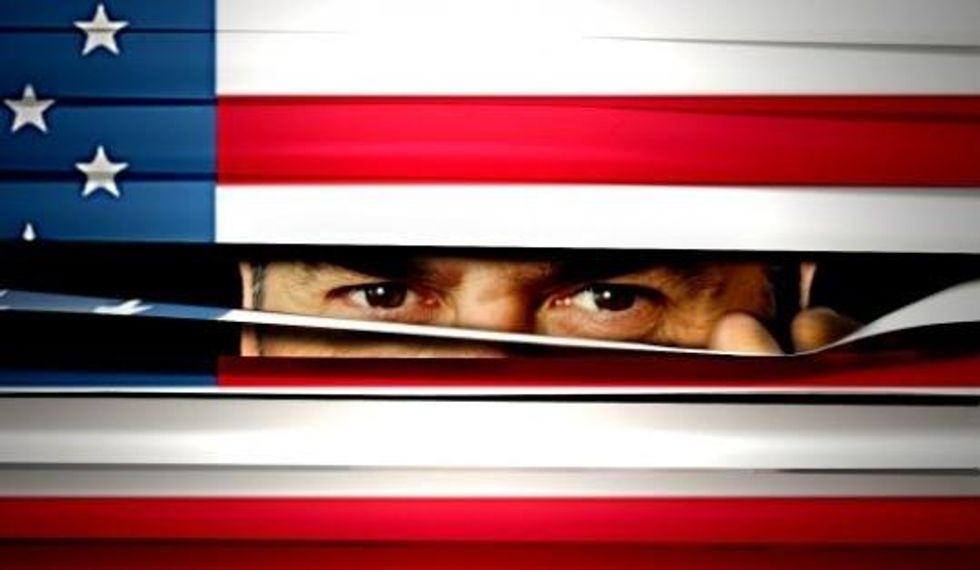Privacy advocates and a prominent civil liberties group sued the U.S. government on Monday, demanding disclosure of how key spy agencies and the executive branch interpret and execute legal authorities that govern a vast foreign electronic surveillance program that also sweeps up the communication data of millions of Americans each year.
Filed in a district court in New York, the suit was filed jointly by the ACLU and the Media Freedom and Information Access Clinic at Yale Law School and called on the National Security Agency, the CIA, and the Defense, Justice, and State Departments to offer details about how Executive Order 12,333 guides the collection and processing of billions of phone and internet records around the world.
ACLU staff attornery Alex Abdo, writing at his organization's blog, explained that the suit was prompted by recent newspaper revelations made possible by leaks by Edward Snowden. Abdo described EO 12,333 as the "most important surveillance order we know almost nothing about," explaining:
Over the last seven months, we have learned an incredible amount about the government's post-9/11 surveillance efforts. But there is a crucial gap in our basic understanding. We now know, for example, a good deal about how the government conducts surveillance that targets Americans, and about surveillance of foreigners that sweeps up Americans' international communications when the actual surveillance takes place on U.S. soil (for example, from a Google facility in the United States). But we still know very little about Executive Order 12,333, which governs the NSA's surveillance abroad -- even when that surveillance sweeps up Americans' communications. [...]
The legal complaint filed by the groups seeks access to relevant documents that will show how the government is interpreting the authority given to it under the executive order--which was first signed in 1981, long before the technical capabilities now available to the NSA were developed.
Part of what the Snowden leaks exposed recently was the way in which the NSA uses both domestic and foreign internet interchanges and data hubs owned by companies like Google and Yahoo to sweep up the international communications of people living or traveling across the globe.
Separate stories based in internal NSA dcouments show how the NSA is able to track cell phone locations across the globe and that Americans traveling abroad are also targeted by the same technology. It remains unclear how the information collected abroad or surveillance against foreign targets is sifted from that of Americans who enjoy, in theory at least, special protections from being spied on by their own government.
As the complaint itself reads:
While the government has released several documents describing the rules that govern its collection and use of Americans' international communications under statutory authorities regulating surveillance on U.S. soil, little information is publicly available regarding the rules that apply to surveillance of Americans' international calls and emails under EO 12,333.
That gap in public knowledge is particularly troubling in light of recent revelations, which make clear that the NSA is collecting vast quantities of data worldwide pursuant to EO 12,333. For instance, recent news reports indicate that, relying on the executive order, the NSA is collecting: nearly 5 billion records per day on the location of cell phones, including Americans' cell phones; hundreds of millions of contact lists or address books from personal email and instant messaging accounts; and information from Google and Yahoo user accounts as that information travels between those companies' data centers located abroad.
And Abdo continues:
The core of the problem is that the NSA has, for years, relied upon its authority to gather foreign intelligence as permission to conduct sweeping surveillance of Americans' international communications. We know that this happens under the laws that govern surveillance on U.S. soil, and recent revelations confirm that it happens -- perhaps to an even greater extent -- in the surveillance that takes place abroad under Executive Order 12,333. Moreover, the rules that govern surveillance under the executive order are of particular concern because that surveillance is not meaningfully overseen by Congress, and it is not overseen at all by the Foreign Intelligence Surveillance Court.
In other words, the executive is conducting surveillance under its own executive order without any real oversight. We now know too well that unchecked surveillance authority can lead to dangerous overreach. That's why we are fighting for the release of documents that would shed light on the internal rules that the executive has set for itself when it monitors international communications abroad -- including Americans' international communications.
___________________________________________




